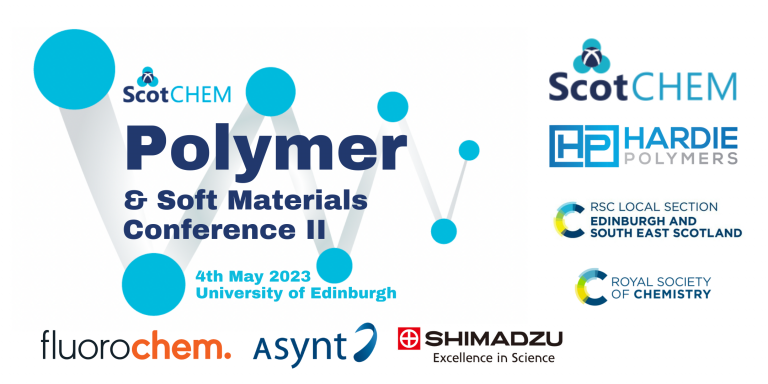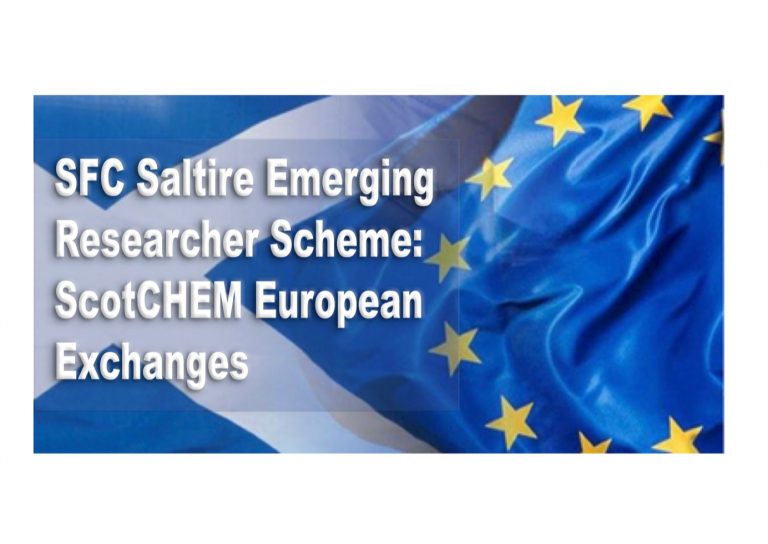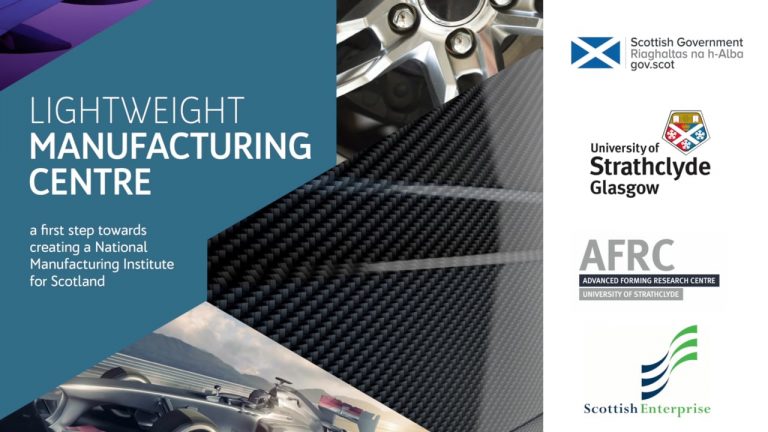Easy and FREE way to teach and learn molecular docking from scratch!
Standalone set of training materials for postgraduate students or adapt it to be part of a course.
If you download and use these resources, please acknowledge ScotCHEM.
Easy and FREE way to teach and learn molecular docking from scratch!
Standalone set of training materials for postgraduate students or adapt it to be part of a course.
If you download and use these resources, please acknowledge ScotCHEM.
The Henry Royce Institute for Advanced Materials has appointed an expert team comprising ScotCHEM, Perspective Economics and Urban Foresight to engage stakeholders across the materials science community in the development of a new National Materials Innovation Strategy.
ScotCHEM is the project lead and, with the team, will expand on the Framework for the strategy, working across the research community to develop both the econometric data and the wider underpinning evidence necessary for scoping, definition and appropriate groupings of:
The project team will work under the direction of the new Materials Innovation Leadership Group, which has been established by Royce to oversee and champion the development of this important new Strategy that will tackle the major challenges and opportunities that lie ahead for the UK.
Development of the Strategy will run from now until the end of 2024, with the first stakeholder workshops being planned for later this year.
Materials underpin manufacturing, and the UK is one of the largest global manufacturing nations, contributing £203 billion every year to GVA and supporting 5 million jobs. 84% of this manufacturing takes place outside of London and the South East.
We look forward to working with industry, government, academia and the 3rd sector to develop this significant strategy for the UK.
For enquiries, please contact [email protected]
Keep up to date with the Strategy development – sign up to the Henry Royce Institute Newsletter

Join an amazing line-up of speakers at the 2023 ScotCHEM Polymers and Soft Materials Conference on 4 May, at the University of Edinburgh.
Dr Amit Kumar ‘Homogeneous (De)hydrogenative Catalysis for A Circular Economy’ – University of St Andrews
Dr Ruaraidh McIntosh ‘Balancing Sustainability with Activity in Polymerisation Catalysis’ – Heriot Watt University
Dr Paul Hunt ‘Practicality of Making Sustainable Polymers’ – Croda International
Dr Emily Draper ‘Using Supramolecular Assembly for Flexible Organic Materials’ – University of Glasgow
Prof Mike Ingleson ‘Electrophilic borylation as a route to generate deep LUMO / near IR-emitting small molecules and polymers’ – University of Edinburgh
Dr Ketan Pancholi ‘Magnetic Polymer Nanocomposites Incorporating Metal-Organic Frameworks: Tailored Synthesis for Targeted Applications’ – Robert Gordon University
Dr Ross Minty ‘The role of residual stress at the fibre-matrix interface in composite materials’ – University of Strathclyde
In May this year, we brought together key stakeholders from industry, academia, government and the NGO sector to identify key barriers to the decarbonisation of the chemical industries, and potential solutions to those barriers.

ScotCHEM is now working with various partners to drive outcomes from the meeting.
This funding aims to support researchers in the development of their independent research and their affiliation with the industry sector.
In May 2021 SULSA and SINAPSE, with support from additional Research Pools and Innovation Centres organised the Our Future Health workshop as part of the Research Innovation Scotland series, in partnership with KTN. This new funding call builds on the success of this workshop and its subsequent activities and is joint-funded across five Research Pools (SULSA, ScotCHEM, SUPA and SICSA) and two Innovation Centres (IBioIC and CENSIS). Researchers from across these Pools are all eligible to apply for this scheme.
Researchers can apply for between £5,000 – £15,000, which must be match funded by an industrial partner or show a strong case for commercialisation of your research. Applications must focus on one of four topics:
This fund is aimed at early lecturers/PIs to support development of their independent research and their affiliation with the industry sector. The project should aim to foster new projects and collaborations across the academic and industry sector and drive novel and exciting research and innovation.
Projects should have a significant consideration for sustainability post-award and show demonstrable potential for securing funding leverage. This scheme is not for continued funding of existing projects.
Applicants are encouraged to reach out to innovation centres and similar organisations where appropriate when developing their application.
* For applications for the commercialisation of research where there is not an industry partner tied in this is not required, however you must show a strong case of support from a business development specialist.
Applications will be reviewed in two stages, first for scientific quality by the relevant Research Pool reviewing panel and secondly by an external panel who will consider:
Call is now closed.
Please submit your application (merged into a single PDF) to [email protected] at SULSA by 5pm on Monday 4th April 2022.
Successful applications will be notified by email.
If successful, funds will be transferred to your lead Institution. Funds must be spent within 12 months of the date of transfer. Upon request funds can be divided up between applicant’s host institutions.
You must provide the SULSA administration with project updates and outcomes at 3 months and 12 months post-award. If this project leads to a published article, or leverages grant funding, please contact the SULSA administration to make them aware. Projects in receipt of funding from CENSIS or IBioIC will receive additional monitoring and support of the project.
These grants are provided by the Scottish Funding Council and must therefore comply with constitute Subsidy Control (previously State Aid).
[Last updated: 20 April 2022]
ScotCHEM was pleased to partner with RIS, KTN, ETP and SRPe to deliver the 3rd workshop in the series: Just Transition to a Net Zero Carbon Society. The report from the workshop can be accessed from the RIS website, together with the reports from workshops one and two.

We are delighted to be one of the consortia selected to deliver the SFC Saltire Emerging Researcher Scheme European Exchange programmes.
Enabling ScotCHEM researchers to collaborate with colleagues in EU Member States, and EEA and EFTA countries will bring benefits not only to individual researchers and their research groups but also to Scotland’s research ecosystem. Growing relationships and attracting talent to Scotland is a key aim of the scheme.
ScotCHEM hosted a webinar to answer questions from the community in relation to the SFC Saltire Emerging Researcher Scheme: ScotCHEM European Exchanges call on Tuesday 19th October 2021 2pm (immediately following the ScotCHEM ECR Seminar).
Applications for the ScotCHEM Saltire European Exchange Programme are now closed.
Application deadline: 28 January 2022.
[Last updated: 25 February 2022]
Applications deadline: 5pm on December 18th 2020
For the last few years ScotCHEM and the SFC have been supporting early career researcher (ECRs) through the PEER and PECRE funds. Due to recent events surrounding the COVID-19 pandemic the remit of these calls seems less appropriate as travel restrictions continue to be very unpredictable. Therefore, ScotCHEM is pleased to open a funding call for ECRs with as much flexibility as possible.
The funding call will be split between two types of applicants and awards, non-independent and independent ECRs (see eligibility criteria below).
Non-independent ECRs can apply for up to £500 while independent ECRs can apply for up to £4000. A minimum of 8 projects will be funded for non-independent researchers and a minimum of 4 projects will be funded for independent researchers.
The project proposal must highlight how it will have a positive impact on the lead applicant’s career and must also fulfil at least one of the following aims:
Submit your applications to [email protected]
Applications deadline: 5pm on December 18th 2020
Enquiries should be directed at Dr Alan Wiles (Director of Operations ScotCHEM) [email protected]

The Lightweight Manufacturing Centre in Renfrew is a new part of the Scottish Government’s National Manufacturing Institute Scotland (NMIS). It will focus on the manufacture of lightweight components for a range of industries in which lighter materials offer benefits, including, aerospace, automotive, oil and gas, renewables, medical, marine and off-highway transport. It will deliver cutting-edge research and development projects involving lightweight materials in partnership with companies in Scotland
The LMC team have suggested the items below for special consideration.
Please email feedback to [email protected].
In your message please consider including: